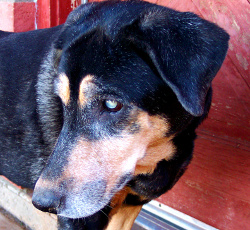
This article was updated on May 1st, 2023

Key Highlights:
– Excess barking is common in senior dogs.
– Possible causes include cognitive dysfunction, incontinence, pain, anxiety, frustration, and decline in vision or hearing.
– It’s important to see your vet if your dog is barking more than usual.
– You should also see your vet if you see signs of illness, confusion, pain, or incontinence.
– A physical exam can help your vet determine the root cause and appropriate treatment.
– There are things you can do to help, such as providing comfort measures, extra potty breaks, and other modifications to your home.
Older dogs bark for various reasons. Some of the reasons are apparent, but some are not. Your senior dog might be:
- barking randomly or for no apparent reason
- barking more than usual
- barking in the middle of the night
Extra barking can be caused by many different reasons. It can be both worrying and frustrating, but it is pretty common in older dogs. In this article, we will explain the 6 most common reasons and show you 6 ways to prevent your old dog from barking excessively.
What are the most likely reasons? Your dog may be:
- scared
- anxious
- in pain
- having sensory issues (such as loss of vision or hearing)
- confused
Barking could be the only way they know to get your attention.
Even if you’re exhausted, or your nerves are jangled, it’s important to realize that your senior dog’s behavior is a sign that all is not well with them. They are not doing this just to irritate you.
Some Senior Dogs Tend to Bark More as They Become Older

Excessive barking is indeed one of the most apparent signs of aging in dogs. However, this is not true for all senior dogs. Some dogs continue to remain very calm and quiet even in old age.
On the other hand, some dogs start barking more often as they grow older because they start feeling confused, anxious, or frustrated, or start experiencing new pain or sensory problems (such as loss of vision or hearing). All of these factors are typically more common with senior dogs.
6 Common Reasons Why Your Senior Dog Might Be Barking More
You might wonder why your senior dog is barking randomly, especially if you can’t see anything wrong with your old friend. Excessive barking (or howling or whining) is pretty common in older dogs.
The first step toward resolving this issue is to figure out what caused it in the first place. The following are some of the most frequent causes with older dogs:
1. Confusion
Unusual night-time barking is a classic symptom of Canine Cognitive Dysfunction (aka “Old Dog Syndrome” or CCD). This condition is pretty similar to Alzheimer’s disease in humans. If your older dog has CCD they might seem lost, confused, dazed, or “out of it” for periods of time.
Dogs might:
- Forget to eat (or that they have eaten already).
- Forget where the furniture is, or what door he’s supposed to use to go outside.
- Forget that they’re supposed to eliminate outdoors (or that they’re not supposed to just pee or poop whenever they get the urge, regardless of where they are at the time!).
- Be confused about where they are, or who you are.
All of these can make a dog anxious, and end up causing barking “episodes.” Sometimes, they may simply bark at nothing at all.
There are lots of other symptoms of Canine Cognitive Dysfunction, and as it’s very common in senior dogs, with varying severity. Therefore, it is good to now what signs to look for in your pet.
If you think your old dog is barking because they are confused, click HERE to find out how to help.
2. Incontinence
As your dog ages, controlling its bladder (and even its bowels) becomes more of a challenge. This is especially true for spayed female dogs, but it can happen to either gender.
Remember how as a puppy your dog needed frequent potty breaks because they couldn’t “hold it” for eight hours? Well, they may be having the same problems again now.
If they have enough control, they may be able to keep themselves from wetting the bed, crate, or floor, but it’s difficult and painful for them to do. When they are not able to hang on long enough, you’re going to be met with a mess in the morning, which can also be upsetting for them and cause them to bark for your attention. Incontinence in older dogs isn’t unusual, and your senior citizen can’t help what’s happening to their body. It’s simply part of the natural aging process.
If your old dog is barking because of incontinence, click HERE to find out how to help.
3. Pain
Our older dogs have bodies that have seen a fair bit of wear and tear over the years. The deterioration of the body is a natural part of growing older, and major organs and joints often don’t work as well as they used to.
This can cause pain or discomfort, as well as other symptoms. Barking due to pain is often sudden in onset and may be associated with certain movements, such as jumping or getting up off of the floor. If your senior suddenly starts barking, then they may be trying to tell you that they feel pain somewhere.
If your dog is barking because of pain, click HERE to find out how to help.
4. Anxiety
Senior dogs can go through some personality/behavior changes as they get older, and many become more anxious than they were when younger.
Your older dog might start barking at strangers more often (or even at people he knows); they might bark at loud noises, or cars, or when you step out of their sight.
Separation anxiety is common in older dogs, even if they’ve never been worried about you being gone before.
It’s all just part-and-parcel of getting older. Also, a dog who is feeling generally anxious or upset might bark just to release that pent-up emotion. It’s a way of “sounding off.”
Find out how to help your dog HERE
5. Frustration
Another possible cause of older dog barking problems (if the barking happens during specific activities) is that your dog is frustrated because they’re having difficulty managing some task.
For example, if they stand at the foot of the stairs and keep on barking, they may want to go up those stairs, but their old joints won’t let them. They are trying to ask you for help.
Get tips to help him HERE
6. Sensory Problems
As the body ages, nothing works as well as it used to, and this is true of senses such as sight and hearing. Poor vision or cataracts can mean that your older dog is seeing the world through very blurry glasses.
This is scary, not to mention it makes life extra difficult when it’s combined with other problems such as creaky joints, or a twitchy bladder.
Hearing loss is fairly common as well, and if Fido can’t see or hear properly, it changes their world in an even bigger way.
It’s not difficult to see how this can make any underlying anxiety problems worse or make even a confident dog more nervous. Also, a noise or movement that they didn’t quite get the full picture of might make your dog bark just to make sure people are aware they’re there.
Bear in mind, too, that older dogs can’t regulate their temperature the way younger dogs do. So, they can get too hot, or too cold, quite easily, which is uncomfortable. If your dog wakes up because they’re uncomfortably hot or chilly, they’re going to let you know about it.
Learn how to deal with this HERE
6 Strategies from Our Veterinary Team:
There’s no way I can promise you that any action you take will stop your old dog from sharing the language of their people loudly, and often.
But, there are some simple things you can do that may help the problem that’s causing the barking, and in turn that might reduce the amount of noise they make or the frequency with which they make it.
So, let’s take a closer look at what you can do to minimize your older dog’s barking.
1. If Your Old Dog Is Barking Because They are Confused
Canine Cognitive Dysfunction can wreak havoc on your senior dog’s personality, routines, attitudes, and behavior. Although it’s quite common, CCD doesn’t happen to all dogs, and there are things you can do to alleviate the symptoms. These include dietary changes, behavior modification, lifestyle changes, and medications.
If you can lessen their confusion, you’re likely to see a reduction in clinical signs- which includes strange or chronic barking behavior (Click here to learn 4 ways to help your dog with Cognitive Dysfunction).
Meanwhile, you can help Fido by not ignoring the barking. He’s making all that noise because he’s confused and anxious. You can try the following:
- Sometimes just a few quiet words or some gentle TLC can help them settle back down.
- You may also try to figure out what things work to calm your dog. Is it a handful of his favorite kibble? A special comfort toy or blanket?
- Give them a quick trip outside (even if they don’t need to go, because the change of scene can sometimes short-circuit the barking cycle).
This may only stop the noise for a short time, but with consistency, it could be that little bit extra that makes all the difference.
2. If Your Dog Is Barking Because They are Incontinent
A leaky bladder or dodgy bowels can mean that your older dog needs one, two, or even several night-time potty trips. If they’re barking to let you know that they need to go, ignoring it will only lead to problems. Obviously, the first step towards stopping the noise is to take them outside so they can relieve themselves. However, waking up several times is exhausting for both of you, and is far from ideal long term.
Here is what you can do:
- There are several treatment options for incontinence, and your veterinarian will be able to help you figure out what’s at the root of Fido’s problems, as well as how to minimize them. Medications or even surgery can help.
- There are ways to manage the problem too, such as doggie diapers or belly-bands.
- You could also put a puppy pad in the bed to absorb leakage and prevent that damp feeling that comes with an accident. See our recommendations for incontinence products.
3. If Your Old Dog is Barking Because They are in Pain
Excessive barking in older dogs which is due to discomfort or pain is upsetting for both of you. But with the range of medications and treatment options available for pets today, there’s really no need for your senior dog to be in pain on a regular basis.
If there’s a chronic condition (such as arthritis) that is causing Fido to hurt, discuss it with your veterinarian and get your dog the help they need to live comfortably. View our page on pain relief for senior dogs.
4. If Your Dog is Barking Because They are Anxious or Scared
If your older dog’s excessive barking is triggered by anxiety or fear, you need to get to the root of the problem in order to improve the situation. Maybe they have always slept on his bed (or in his crate) in the kitchen, but now they’re upset. Here is what you can try:

- Try moving the bed or crate into your room. Sometimes just knowing that the people they love are close by can settle them down.
- If this is an absolute no-no (maybe due to allergies, or something similar), then try putting one of your old worn T-shirts or used pillowcases into his bed or crate. The scent may be enough to calm your dog.
- Puppies often are less stressed if they have a ticking alarm clock and a soft toy to cuddle up to. This can also help senior dogs.
- You can also try Snuggle Pals or Cuddle Puppies, which are specifically designed for calming puppies.
- Tips and tricks used for separation anxiety in dogs of all ages can also be helpful. These include leaving a radio or the TV on at low volume (providing your dog’s hearing is good enough to pick it up).
- A pheromone diffuser, or a pheromone collar might also help. Leaving a light on when it’s dark may help.
If none of these work and you know that Fido’s distress is caused by their nerves, there are natural treatments that can reduce anxiety as well as medications your veterinarian can prescribe if they feels it’s necessary.
5. If Your Old Dog is Frustrated
Older dog barking that’s triggered by frustration often happens during the daytime when your dog is active. It’s probably the easiest one to diagnose because the source of the frustration is easy to recognize.
The example of stairs which I used earlier in this page is a classic example. Other sources of frustration may be being unable to chase a ball or play actively with a toy, having difficulty chewing treats or food, being unable to join in play or activities with other dogs, and so on.
The only answer to this type of barking is to help your dog overcome their limitations as far as possible (for example, by giving softer treats, or buying more sedentary but interesting toys), and then use distraction and substitution for the things it simply can’t manage.
If you’re empathetic, creative, and persistent, you’ll be able to make life less frustrating for your senior dog with a bit of extra effort.
6. If Your Senior Dog’s Senses Are Deteriorating
Sometimes there are things you can do to improve the situation; for example, cataracts can be corrected surgically.
But the normal age-related deterioration of sight and hearing is just something that you and Fido will need to learn to live with.
Still, if this is what’s causing them to bark excessively, there are still things you can do to help.
If your older dog is having trouble with his eyesight, they might have trouble finding their way around at first.

They need to commit the layout of their home and yard to memory so that they can navigate it properly.
Things you can do to help with this include resisting the urge to move furniture around, keeping doors open as much as possible (so that they won’t walk into them), and putting up baby gates at the bottom or top of the stairs.
Also, don’t allow the kids to leave toys lying all around the house (or in the garden).
Outside, try not to change the layout of paths or flower beds, and don’t add a water feature (or a pool!) unless it’s securely fenced in.
If your dog still has some sight, leaving a low light on where they sleep may make them less anxious if they wake up. After all, it’s pretty scary to wake up and not be able to see anything!
If the problem is with their hearing, unfortunately, there’s less you can do to help.
If your dog can still hear a little, a TV or radio to keep them company (if they sleep in a separate room from you) can ease their worries as they won’t feel so alone and isolated if they wake up.
One of the signs that your dog is going deaf can be that they bark more loudly than normal.
They may also seem to ignore you when you call them or seem startled when you pet him or disturb their daydreaming (because they didn’t hear you coming).
If Fido wakes up too often because they’re too hot, or too cold, these are things that you can usually fix pretty easily.
You can buy heated or cooled dog beds, and if your dog is crated, you can even use a small cooling fan or space heater.
Adjusting the thermostat in your home to meet your dog’s needs might sound a little extreme to some, but most doggie parents are quite okay with doing this.
A warm blanket or a snuggle pal (some have inserts that you can heat or cool) can help, too.
You can also throw a blanket or comforter over the crate as an extra layer of insulation if a chill is a problem.
What Questions Will My Vet Ask Me?
Your vet may ask you some questions in order to determine why your senior dog may have suddenly started barking, including:
- When did the barking start and is it becoming more frequent and/or louder?
- Is there a particular time of the day when your dog barks more?
- Does the excessive barking seem to be associated with any specific activities or stimuli?
- Have you noticed any other changes with your old dog that seem to coincide with the excessive barking?
How Will My Vet Diagnose the Issue?
Your vet will perform a thorough clinical exam to assess your dog’s overall health, focusing on specific areas depending on your dog’s barking patterns.
For example, if excessive barking seems to be related to your dog’s urination habits, analyzing a urine sample and kidney function will be useful.
If your dog barks when performing specific movements, your vet may want to perform X-rays to look for possible musculoskeletal causes of pain. Once a likely diagnosis is reached, your vet can prescribe medication where appropriate.
And finally:
If your older dog’s barking SOUNDS different from the way it used to (whether or not they are barking more), then it’s important to have your veterinarian check them out. There are some health conditions that can cause this and are seen most often in senior dogs.
The most common one is laryngeal paralysis, which can cause other problems as well as the strange-sounding bark. Luckily there are treatment options available. Other possibilities include a tumor, or an underlying health condition, perhaps even heart disease. Your vet will be able to make an accurate diagnosis and get treatment started, so if your older dog’s voice sounds “funny,” make sure they get a check-up.
Related Posts
 Old Dog Barking At Night: Top 6 Reasons & What to Do - Your old dog suddenly starts barking at night. You get up to investigate. You breathe a sigh of relief: there… [...]
Old Dog Barking At Night: Top 6 Reasons & What to Do - Your old dog suddenly starts barking at night. You get up to investigate. You breathe a sigh of relief: there… [...]Disclaimer: This website's content is not a substitute for veterinary care. Always consult with your veterinarian for healthcare decisions. Read More.




Thank you for your words of wisdom. My sister’s sweet Bella is 10 and has begun to bark and whimper during the night. It’s been frustrating on all of us and now we have a better understanding of what’s going on in Bella’s world. She’s also been licking more than she has in the past and has hot spots and sores. We are forever grateful for your article.
I have a 14 yr old labradoodle who has just started barking at night over the past couple of months. We’ve tried calming medicine, making sure he goes out later at night. He has been on keppra for a seizure disorder for quite a while now, so I don’t think that’s the issue. Lately he has been barking short whiles in the day time, but nights are very frustrating and we’ve actually taken in out the last two nights at 2am when he wakes us barking. Most of his barking takes place in early to mid evening. We hate not being able to make him less anxious and are now going to discuss with his vet who has cared for him since birth.
My 13 year old Shih Tzu has been barking excessively throughout the day and night. Just this morning he barked for over 2 hours. I tried everything to get him to stop. Picking him up will quiet him for a moment. But as soon as I put him down he starts barking again. We are losing sleep over this because he barks all throughout the night. He starts to cry and then the barking begins. We are at our wits end. Please someone help.
My Nearly 16 yr old Jack Russell barks constantly from approx 5 pm until I give in and go to bed with her in my bedroom; she then settles well. Alas I don’t want to go to bed early but she is so persistent that I feel so tense as the barking is constant. We walk approx 10k steps a day and she’s really happy with that. Her sight and hearing are very bad but she copes well.. it is just so frustrating and whilst she had medication for dementia it’s not proved successful. I’m at a loss as what to do. It makes me so tense and I feel so inadequate with my inability to calm her. Is it time for euthanasia I ask myself.
I’ve found great help with My 13-year-old labradors reoccurring barking problem it’s kind of an anxiety issue I think and he has bad arthritis so it’s hard for him to get around but I found great relief and CBD oil to relieve his anxiety it quiet some down and make some calm I love it
What CBD oil did you get and where..my older collie starts barking the moment I walk out ic the room. Its driving me crazy..I am so worn out. I know he has dysplasia in his hips and on the slipper floor planking he slips and falls and getting traction. On the is difficult. I want to get him a good CBD oil that actually works . Can u help me where to purchase it, I don’t trust many adds and I know from personal use for myself there’s alot of rip offs actually the best I ever had was in Europe. Two drops and I slept like a baby. I had to go back to Ireland and the oils I bought there were useless. I am in the states and want guality oil for my fur baby. I hope u cam advise me who to buy from. None of the oils are cheap and I don’t want to get ripped off. I just want his anxiety to stop and this crazy barking to end. Thank you Kathleen
Hi, I have a 14 yr. old golden who can’t get up without help otherwise in good health! I recently got a golden puppy. It took couple weeks to warm up to & 14 yr. old plays with toys like he used to! But he also barks a lot for no reason & when he wants nothing to do with puppy! We keep them apart. He also barks when people leave the room. Would CBD oil be good for him. Do you think the excessive barking is because of the puppy? Thank you!!
Hi! This is happening to my 15 yr old shih tzu 😫😫😫
May I ask what ended up happening??
he is anxious about walking on the floors because he slips. Also if he has hip arthritis the last thing you want him to do is slip and slay out. He may not be able to get up if you’re not at home. You can buy a topical that you put on his feet so he wont slip on the floors. There are other slip preventive products, so look into it.
My 15 year old dog barks constantly it’s really bad. He’s blind and deaf and I am at the point to put him to sleep. I dont want to as I love him but its stressing me out. My husband takes him out for a walk at night but my husband has mild strokes and I can’t cope.
Thank you! My Chocolate Lab turns 15 y/o in 5 days. In the past week, he’s been barking excessively. Usually when I’ve left the room and he can’t figure out where I am. I step back to where he can see me and say “I’m right here buddy”, then he’s ok and follows to where I am. He’s always had a bit of separation anxiety, but based on your comments, I believe the problem is he can’t hear nor see well anymore. So difficult to deal with, but now I know what the problem is. Thank you.
Thank you for the helpful tips! My older dog has been barking more lately, and I really appreciate the insights on understanding the underlying reasons and potential solutions. I’m definitely going to try some of these strategies to help him feel more comfortable!
Great tips! My old lab has been barking more lately, and I appreciate the advice on understanding his needs and adjusting our routine. I’ll definitely try some of these suggestions. Thanks for sharing!
Thank you for this insightful post! I’ve been struggling with my old dog’s excessive barking lately, and your tips on identifying triggers and providing mental stimulation are really helpful. I’ll definitely try some of these suggestions to keep him more relaxed.
This post was really helpful! I’ve been struggling with my older dog’s barking, and it’s nice to know there are strategies to help calm him down. I’m definitely going to try some of these tips! Thank you for sharing your expertise!
Thank you for this helpful post! My old dog has been barking more than usual lately, and it’s been tough to manage. I appreciate the tips on identifying triggers and keeping him engaged. I’ll definitely try some of the suggested activities to help calm him down!
Great tips! I didn’t realize that changes in environment could affect my dog’s barking. I’ll definitely try some of the calming techniques suggested. Thanks for sharing!